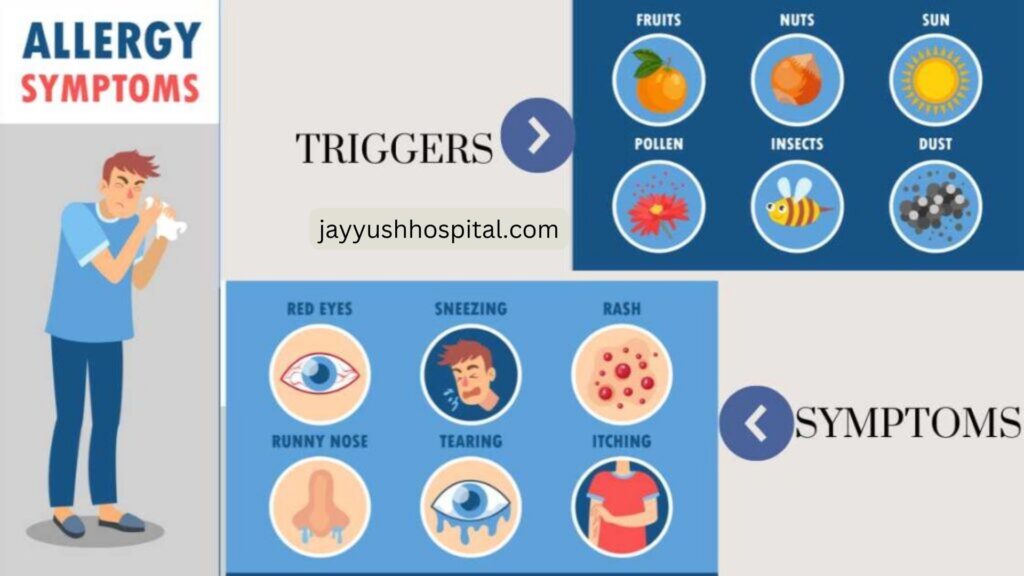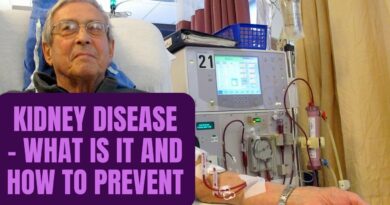What are Allergies, its sign-symptoms, types

Allergies are your body’s way of saying, “I don’t like this!” They are your immune system’s response to foreign substances that, under normal circumstances, wouldn’t harm you but cause discomfort. These troublesome substances are known as allergens. They can take various forms, from certain foods to pollen or pet dander.
When you encounter an allergen, your immune system springs into action, producing antibodies to combat what it perceives as a threat. Unfortunately, this defense mechanism often leads to a wide range of symptoms and signs, from mild nuisances like a skin rash to life-threatening conditions like anaphylaxis.
What are the signs and symptoms of allergies?
The symptoms of allergies can be quite diverse. They include:
- Sneezing
- Itching of the nose, eyes, or roof of the mouth
- Runny, stuffy nose
- Watery, red, or swollen eyes (conjunctivitis)
- Hives
- Swelling of the lips, tongue, face, or throat
- Cough, chest tightness, wheezing, or shortness of breath
- Anaphylaxis – a life-threatening allergic reaction
Causes of Allergies
Allergies can be triggered by various sources, including:
- Pollen from flowers of trees, grasses, and weeds
- Dust mites, cockroaches, and mold spores
- Animal dander and saliva
- Insect stings and bites
- Certain foods, such as peanuts, tree nuts, milk, eggs, fish, shellfish, soy, and wheat
- Certain medications, such as penicillin, aspirin, and ibuprofen
- Latex and other substances that touch the skin
How to diagnose allergies
To diagnose allergies, you should consult a doctor. They will inquire about your symptoms, medical history, and family history. Additionally, they may conduct several tests to confirm the diagnosis. These tests may include:
- Skin prick test: A small amount of a suspected allergen is pricked on the skin, and the reaction is observed after 15 minutes.
- Blood test: A blood sample is sent to a lab to measure the level of IgE antibodies to specific allergens.
- Oral food challenge: A small amount of a suspected food allergen is given to the patient under medical supervision, and the reaction is monitored.
- Patch test: A patch containing a suspected allergen is applied to the skin and removed after 48 hours to check for any signs of contact dermatitis.
How do you treat allergies?
Managing allergies often involves a combination of approaches. Here are some common treatment options:
- Antihistamines: These medications block the effects of histamine, reducing itching, sneezing, and a runny nose.
- Decongestants: They shrink swollen blood vessels in the nose and sinuses, relieving congestion.
- Nasal sprays: These deliver steroids or antihistamines directly to the nasal passages to reduce inflammation and mucus production.
- Eye drops: They soothe irritated eyes.
- Allergy shots (immunotherapy): Gradually increasing doses of a purified allergen are injected to desensitize the immune system.
- Epinephrine (adrenaline): A life-saving medication that can reverse the symptoms of anaphylaxis.
Are there natural remedies to treat allergies?
Some natural remedies may offer relief, but it’s essential to consult your healthcare provider before trying them:
- Saline nasal irrigation: Rinsing the nasal passages with a saltwater solution can flush out allergens and mucus.
- Butterbur: An herb with potential anti-inflammatory and antihistamine properties.
- Quercetin: A plant pigment that may inhibit histamine release and reduce inflammation.
- Bromelain: An enzyme found in pineapple that may reduce swelling and inflammation.
- Probiotics: Beneficial bacteria that may help balance the gut microbiome and modulate the immune system.
How can you prevent allergic attacks?
Preventing allergic reactions involves minimizing exposure to allergens:
- Stay indoors when the pollen count is high and keep windows and doors closed.
- Use a high-efficiency particulate air (HEPA) filter in your home and vacuum regularly.
- Wash your bedding and curtains in hot water and use dust mite-proof covers on your mattress and pillows.
- Keep your pets out of your bedroom and off your furniture, washing them frequently.
- Wear protective clothing and gloves when handling substances that may cause contact dermatitis.
- Read food labels carefully, avoiding foods you are allergic to or that may contain traces of allergens.
- Carry an epinephrine auto-injector if you have a history of anaphylaxis and know how to use it in case of an emergency.
What are complications of an allergic reaction?
Allergies can lead to various complications, including:
Asthma:
A chronic condition that causes inflammation and narrowing of the airways, leading to wheezing, coughing, and difficulty breathing. Allergies can trigger or worsen asthma symptoms in some people.
Sinusitis:
An infection or inflammation of the sinuses, which can be exacerbated by allergies, leading to congestion and mucus buildup.
Otitis media:
Infection or inflammation of the middle ear, which can result from swelling caused by allergies, leading to fluid accumulation.
Eczema:
A chronic skin condition characterized by dry, itchy, and inflamed patches of skin, which allergies can trigger or worsen.
Anaphylaxis:
A severe allergic reaction that affects multiple organs and systems in the body, potentially leading to life-threatening symptoms if not treated promptly with epinephrine.
Conclusion
Allergies are uncomfortable, but understanding them is the first step toward managing and mitigating their impact. While there is no cure for allergies, there are many ways to treat and manage this condition. If you suffer from allergies, consult your doctor for guidance on how to alleviate your symptoms and improve your quality of life.
Final words
This article aimed to shed light on the causes and symptoms of allergies. In the next article, we will delve into how certain foods can trigger allergies in the gastrointestinal system. If you found this article helpful, please share it through the provided social media channels.
Useful Resources:



